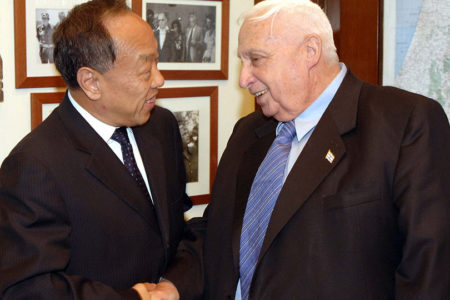Eye on the Middle East Sep/Oct 2006
Over a year ago, in a good-faith attempt at conciliation to Palestinian and international demands, Israel left the Gaza Strip. Eight thousand to 10,000 Israeli citizens were expelled from their homes by their own government, and the Israel Defense Forces were evacuated.
The move was promoted on the pretext that the Palestinians would see the light at the end of the tunnel and that the green fields of statehood would beckon them to the other side. As for the Jewish state, many believed disengagement would give Israel a drop of tranquility in the vast ocean of Arab hostility.
Israel’s unilateral withdrawal from Gaza—for which it received no concessions in return—marked the first time in history that the Palestinian Arabs received independent territory. Neither the Muslim Ottoman Turks, who ruled the area for some four centuries, nor the British, Egyptians, or Jordanians ever allowed the Palestinian Arabs to govern themselves. Israel has been the first nation in history to do so.
In the minds of many Westerners and Israelis, this show of good faith would provide a golden opportunity for the Jewish state to be rewarded by responsible economic and social progress for the impoverished Palestinian people. Israel left behind all its agricultural and industrial equipment to facilitate Palestinian growth and trade. In other words, the means were there for these Arabs to go it alone and become more than slum-dwelling victims of irresponsible and indifferent Palestinian leaders.
Unfortunately, such was not the case. The next day the first of thousands of Kassam rockets and mortar rounds began striking Israeli towns. In addition to receiving a steady stream of volatile weapons into the Strip, Gaza rolled out the welcome mat for some of the world’s most vicious terrorist killers. With the election of Hamas to power and the acceleration of cross-border attacks, kidnappings, and murders, the Palestinian hierarchy made its intentions brutally clear: It would not create a peaceful, productive showcase to demonstrate to Israel and the international community that Palestinians were ready to make the leap into a viable state. Western politicians were mystified, and Israel was rebuffed and left to suffer the consequences.
Not on the ledger was there any intent by the terrorists pulling the strings in Ramallah, Tehran, and Damascus to decelerate violence, much less concede anything more than lip service to peace—on their terms, of course.
The goal is to fight until Israel and the Western democracies are destroyed. Therefore, peace would put a serious crimp in their jihad-driven agenda. They want a nation whose people teach their children to strap on homicide belts, rather than one whose people work at good jobs; receive suitable remuneration for their efforts; live on clean streets; and teach their children reading, writing, and arithmetic.
The recent announcement by the al-Aqsa Martyrs Brigade of the recruitment of 100 female suicide bombers, with more in line to sign up, exposes the heart of the matter. Islamists are among the few people on the planet who celebrate defeats as victories. Prof. Barry Rubin has said, “Celebrating martyrs simply means bragging about your own casualties.” This is precisely what people who value life and fight only to achieve a legitimate goal do not understand. For Islamists, fighting is not a means to an end; it is an end in itself.
When the late and unlamented Palestinian chieftain, Yasser Arafat, refused to accept a Palestinian state on a platter offered by then Israeli Prime Minister Ehud Barak in 2000, virtually everyone asked why. Instead, he opted for a war that would see thousands of new casualties among Israelis and his own people. Irrational? To us perhaps, but not according to the rules of the 1974 Palestine National Council in Cairo, Egypt, which agreed to accept territorial concessions and use them as sanctuaries from which to wage war until all Israel is destroyed.
This determination of strategy was confirmed when a Hezbollah terrorist force recently crossed the border into northern Israel, killing eight Israeli soldiers and taking two others hostage. Did Hezbollah know Israel would retaliate and that the Lebanese people would be caught in the crossfire? Certainly. But its concern was not for the people of Lebanon. Its concern was to create an opportunity to fire on Israel from its stockpile of weapons that are longer in range and more deadly in accuracy than any it had used previously.
It is difficult to argue with reports that Hezbollah terrorists acted as surrogates for the Iranians who needed both relief from international pressure and shelter for their frantic attempt to develop weapons of mass destruction. If this war was, in fact, Iran’s doing, it was successful and will only rain more misery and destruction on the people of the Middle East while it gears up to destroy the rest of us as well.
What has also been put on display for the world to see is that terrorists can successfully create a state-within-a-state situation in a country that becomes politically paralyzed. We now see how they can hold a country hostage and implement an agenda of their own at the expense of the people they victimize.
This was the case in the 1970s when Arafat and his Palestine Liberation Organization (PLO) used the same tactic in Jordan. Spurning the authority of King Hussein, the PLO terror groups staged cross-border attacks into Israel. The Israelis quickly retaliated, and the Jordanian population paid for Arafat’s malicious adventurism.
But in this case, the archterrorist underestimated his opposition. Jordan’s late king had the forces and ability to handle the problem—and it wasn’t through vapid diplomatic blather at the UN. He sent his troops on a bloody expedition against the PLO and ousted them from the country in an episode remembered as Black September.
In Lebanon, however, the government has not been in control of national affairs for decades. First, it was besieged by the late Syrian president, Hafez al-Assad, and his occupation force. Then, when the Syrians withdrew in measure, Hezbollah moved in to fill the void and carved out a ministate in South Lebanon. Thus, for the past six years, since Israel withdrew from the southern security zone it maintained for 20 years, Hezbollah moved into the area with its fingers on the trigger, awaiting its opportunity to make war.
And that, my friends, is why the fight goes on today.






